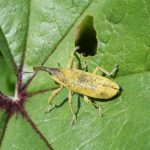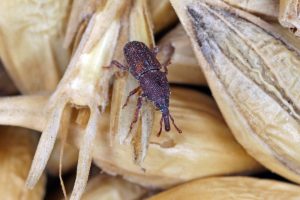
Stored Product Pests control in Melbourne
Stored product pests are found in almost every home and cover a large number of insects. Your stored food products can become infested anywhere during the process from production until it arrives in your home. They can also originate in the home when susceptible items are stored for long periods of time. The list of insects that can be found in your food includes the Saw-tooth beetle, cigarette beetle, lesser grain borer, rice weevil, granary weevil, bean weevil, flour beetles, booklice, Mediterranean flour moth and Indian meal moth.
Nearly all dried food products are susceptible to insect infestation, including cereals, flour, cake mix, rice, spaghetti, biscuits, seeds, dried beans, nuts, chocolate, dried fruits, spices, powdered milk, and tea.
Non-food items that may be infested include bird seed, dry pet food, ornamental seed and dried plant displays, dried flowers, garden seeds, and potpourri.
Stored product pests are most likely to infest products that have been left open, but are also capable of penetrating unopened packaging. Insects within an infested product will begin multiplying and can spread to other stored foods not only in the same area but in other rooms in a home or business.
Businesses like restaurants, cafes, food processing centres or storage sites can greatly benefit from an ongoing professional pest management program to contain and eradicate infestations, along with high standards of hygiene and sanitation, including stock rotation practices. EPC – Enviro Pest Control is experienced and operate in compliance of HACCP guidelines and follow the AEMPA Code of Conduct guidelines and A Code of Practice for Pest Management in the Food Industry.
EPC – Enviro Pest Control recommends identifying and removing the source of the infestation as a critical part of effectively controlling these pests.
Some of the more commonly found in Melbourne by EPC – Enviro Pest Control are;
- Indian Meal Moth (Plodia interpunctella)

- Adult wingspan 13 – 20 mm
- two-toned (tan and copper coloured) wing pattern whilst larvae tend to be whitish in colour
- The complete life cycle takes 25-135 days, with 4-6 generations per year
- Females lay up to 200 eggs onto food source
- Mature larva is usually dirty white, but may vary to greenish, pinkish, or brownish, depending on the food it eats.
- Temperature and availability of food determine the length of the larval stages
- Preferred pantry foods are dried fruits, nuts, chocolate, powdered milk, bird seed, dog food, and a variety of grain products
- The adult Indian Meal Moth causes no damage
- Attracted to grain, grain products; corn, lots of different dried foods, such as fruit, nuts, seeds, also, biscuits and powdered milk; chocolate, candy; dried red peppers; dry dog food
- Booklice – Psocids (Liposcelis spp.)
- Approx. 1 mm long, usually looks like a ‘moving carpet of dust’ on grain or storage packaging
- Vary in colour depending on species
- Eggs are laid on grain surfaces, hatching to nymphs, moulting through to adults
- Prefers warm, moist conditions
- Life cycle 21 days
- Common in factories on pallets
- Weevils – Rice Weevil (Sitiphilus oryzae) & Granary Weevil (Sitiphilus granaries)
- Approx. 2.5 – 4mm long
- Rice Weevils tend to be reddish brown in colour with 4 pale spots on their body
- Granary Weevils don’t have spots and are dark brown to black in colour
- Life cycles are 4–6 weeks but adults can live up to 6 months.
- A primary pest of grain, both these weevils could be considered the most destructive pest of stored products
- Females bore holes in a grain kernel where the larvae will develop
- Prefers grains such as wheat, rice, maize, barley and oats but will occasionally attack other stored foods such as spaghetti
- Coffee Bean Weevil (Araecerus Fasciculatus)
- Approx. 1.5-4 mm long
- Dark brown beetle with light brown spots and long antennae
- Larvae bore into coffee beans in which they pupate
- Larvae are slim, footless, curved and hairy and grow to a length of 5-6mm
- Mainly infest corn, cocoa, coffee beans, dried fruits, nutmegs, ginger etc.
- Confused Flour Beetle (Tribolium Confused)
- Approx. 3–4 mm long
- Reddish brown in colour
- Often confused with the Rust-Red Flour Beetle
- Female lays between 400 – 500 eggs
- Adults may live longer than 3 years, and females may lay eggs for more than a year
- Eggs are deposited directly in flour, other food material, or attached to the surface of the container. White or colourless eggs covered by a sticky webbing to which flour can adhere
- Eggs hatch in 3 – 5 days at 32 – 35°C
- Mainly infests products such as grain, flour, cereal, beans, cacao, cottonseed, shelled nuts, dried fruit, dried vegetables, drugs, spices, chocolate, and powdered milk
- Cigarette Beetle (Lasioderma serricorne)
- Approx. 3-5 mm long
- Reddish brown oval body
- Life cycle of 1-4 months
- This beetle can be a huge problem on a commercial scale. They are primarily feeders of tobacco however they will also feed on seeds, grains and even spices and curry powder
- Saw-tooth Grain Beetle (Oryzaephilus surinamensis)
- Approx. 3 mm long
- Dark brown-black with distinctive saw-tooth pattern on each side of thorax
- Fast moving and can fly in warm conditions
- Females lay 300-400 eggs loosely through grains
- Life cycle 3 weeks at 30C+ , and 17 weeks at 20C-30C
- Infests grains, oilseeds, peanuts, dried fruit and processed products, but likes to attack cereals, cake mixes, biscuits and chocolate
- Flour Mite/Grain mite (Acarus siro)
- Approx. 0.5 mm long
- White or pale brown in colour
- Slow moving
- Life cycle 9–11 days at 23°C
Disease and Contamination from Stored Product Pests
Stored grain insects are a health hazard in both private homes and businesses like bakeries, restaurants, food processing plants, supermarkets, stores, and warehouses.
Stored Product Pests can cause enormous economic losses to businesses through damage and contamination of food products.
Any contamination will make your food unfit for human consumption.
Do not risk it, a small infestation can increase exponentially. Call EPC – Enviro Pest Control for a tailored IPM (Integrated Pest Management) plan.
Signs of Stored Product Pests Infestation
A sign of infestation in the product is contamination by silk webbing, frass, cast skins, pupal cases and adult remains.
Signs of the presence of these pests may be:
- Both live and dead insects around the food or on nearby shelves
- Food connected together by fine, cobweb-like strands of silk. This indicates the larvae of moths are present. May also be present on outside of packets in in crevices nearby
- Unpleasant odours may be present in heavily infested foods
- Moths may be seen flying in the pantry
- Faecal material — usually present as fine dust in packs of grain
- Grain foods, such as rice, hollowed out
Despite their tiny size, these insects present a large threat to your health and businesses. Potential harm includes the contamination of foodstuffs and goods – resulting in serious loss of valuable stock.
When these signs are noticed, it’s important to act quickly to eliminate the threat and EPC – Enviro Pest Control is familiar with these pantry pests and have the experience to eliminate them.
Fun Facts about Stored Product Pests
- The Indian meal moth was given its name after a scientist found one feeding on cornmeal, also known as Indian meal.
- A clean glass container can help identify grain pests. Place live insects into a warm glass container, (warm so they are active but not too hot or they’ll die). Weevils and Saw-tooth Grain Beetles can easily walk up the sides of the jar, but flour beetles and lesser grain borers cannot.
Why choose EPC – Enviro Pest Control Pty Ltd?
If you live in Melbourne and have a Stored Product Pests problem of any size, you should choose us to help you solve it because:
- We use chemicals that are HACCP compliant
- EPC – Enviro Pest Control staff are Trained Specialists and are very experienced at getting rid of Stored Product Pests
- We arrive on time
- EPC – Enviro Pest Control staff are discreet, friendly and professionally presented
- Fairly priced service with advice to help prevent Stored Product Pests coming back
- EPC – Enviro Pest Control’s pest control services, including for Stored Product Pests are effective
Call EPC – Enviro Pest Control for a tailored IPM (Integrated Pest Management) plan.
